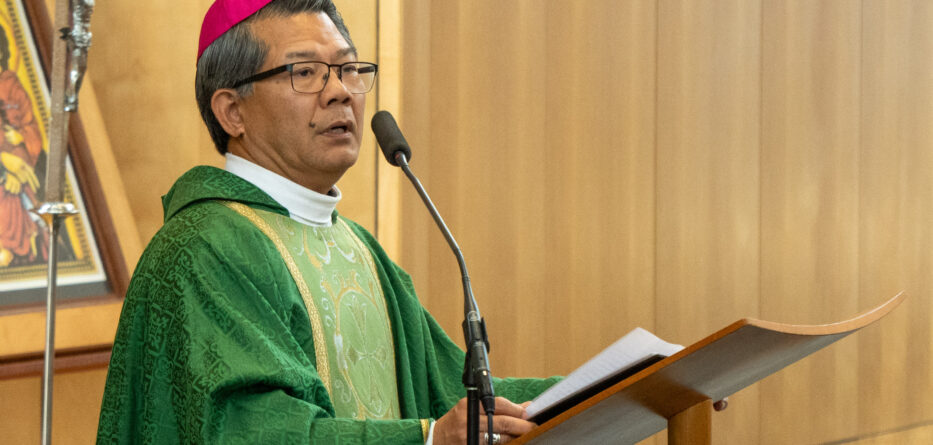Most Reverend Vincent Long Van Nguyen OFM Conv DD STL, Bishop of Parramatta
Homily for the Fifth Sunday of Ordinary Time, Year B
2024 5B The witness of service, compassion and vulnerability in the suffering world
Readings: Job 7:1-7; 1Cor 9:16-23; Mark 1:29-39
Dear friends,
Why do bad things happen to good people? Why do the young and innocent children suffer so cruelly and needlessly at times? Where is God in the midst of tyrants, wars, diseases and natural disasters that cause so much misery, suffering and death? These and other similar questions have been asked of us at one time or another. Indeed, it is difficult not to be deeply moved when we see images of people, particularly little children, being maimed or killed during the war in Ukraine and Gaza. Many years ago, I witnessed a child dying of cancer in a hospital. The image of that child grasping his mother’s hand and breathing his last still haunts me to this day.
Scriptures for this 5th Sunday do not give us a rational or definitive explanation to human suffering. They do tell us that God reveals himself not as one who is removed, distant and aloof from us. In Jesus who immersed himself in every kind of painful situation imaginable, God is acquainted with our grief. He called us to follow him on the path of suffering, death and resurrection that would transform the world into a mirror of God’s kingdom.
In the book of Job, we hear the inspiring story of a righteous man who was tested to the limits of human endurance. Today’s episode tells us that he is at the lowest ebb of his life. As he sits on a dung heap, his wife and his best friends join the chorus of judging him through the lense of the old reward and punishment binary. With pious platitudes and shallow explanations, they maintain that God would only punish the guilty and thus Job is on the receiving end of a victim blaming talk.
Instead of assuming that we deserve something on account of our deeds, Job simply acceptsthat everything is owed to the Creator. “Remember that my life is but a breath” he cries at the end. This is the realisation that we can claim nothing to ourselves, even the right to exist. So, rather than feeling that we are entitled to something, Job teaches us that we should reset our lives with the attitude of freedom from all attachments.
Job learns to move to a deeper and more mature faith through suffering. This is also the pattern that Paul went through. He knew personally what it meant for him to die to his previously held certitudes, privileges and entitlements in order to live with the uncertainty and vulnerability of the Christian faith. In fact, Paul’s constant theme was to accept humbly the gratuity of the gift of faith as he reordered his life according to the Gospel of unmerited grace. It was this grounding in the way of Jesus that prompted him “to offer the Good News free” rather than to use the human calculus of who is worthy and who is not.
The Gospel tells us how Jesus goes about announcing the coming of the kingdom and embodying the reality of that kingdom in his public ministry. In him, we meet a God who heals the sick, casts out evil spirits and makes people whole again. In him, we see God’s definitive response to the perennial questions that Job raises on behalf of humanity. This response, however, does not lie in the worldly model of conquest, dominion and power. Jesus is not a kind of a magician or a superhuman, flying in from above and pulling people out of harm’s way. It is the power of love and self-sacrifice that he exemplified. It is the kingdom model of empathy, compassion and service that he called us to embrace.
Jesus conquered the forces of evil, not only by his divine powers but also by his commitment to the reign of God’s mercy, justice and love. He has shown us the way to defeat the footprint of darkness by his own suffering, death and resurrection. In him, we can draw the same power with which to conquer the evil forces today.
Dear friends,
The Word of God teaches us that crisis can be the catalyst for growth and it is a critical and more engaged faith that is the object of the Christian life. Job and Paul underwent profound crises that shook the foundations of their religious, social and personal worlds. They moved beyond doubt, despair and even critique of their traditional belief system to a deeper faith. Meanwhile, Peter’s mother-in-law also became a model disciple. She got up and served others after being cured of her illness. Mature faith always grows into engaged discipleship.
In the face of our disappointments and crises, we struggle to make sense of life through the prism of our Christian faith. Jesus showed us that God is with us in our every struggle. He also showed us that the way to transcend suffering and death is ultimately the way of the cross. Job is the precursor to the suffering Servant and compassionate Messiah. Paul points to the crucified Christ as the object of the Good News and the model for a new humanity. May we live like Christ as a way to share with the suffering and to reconfigure the world in accordance with God’s purpose.








